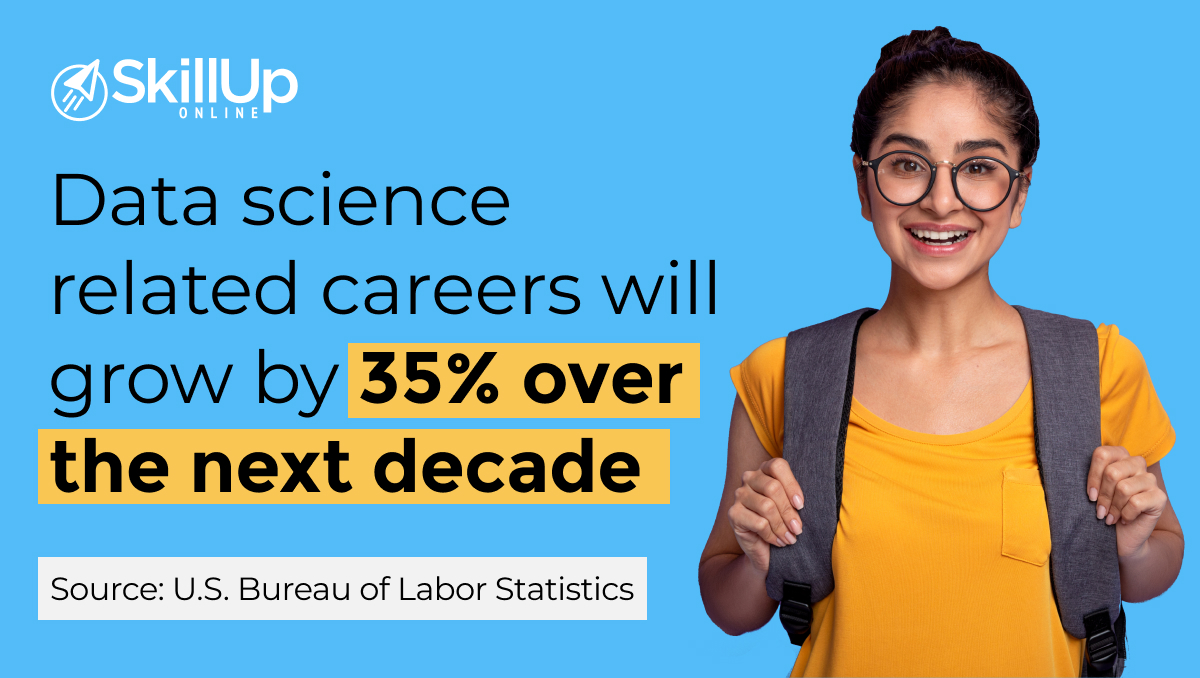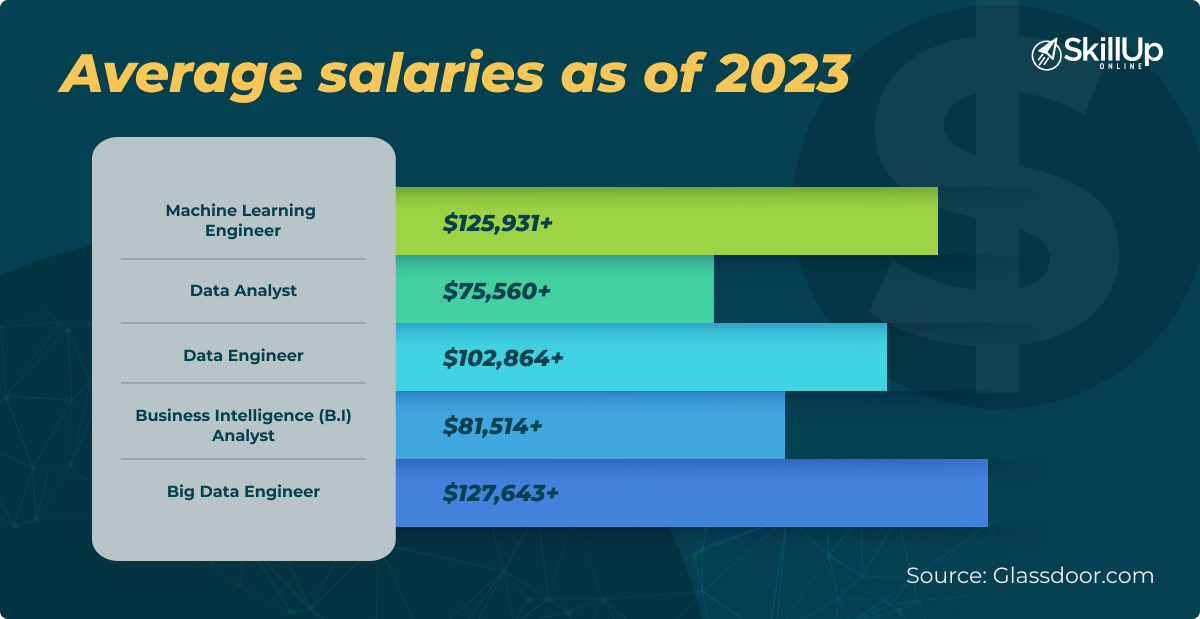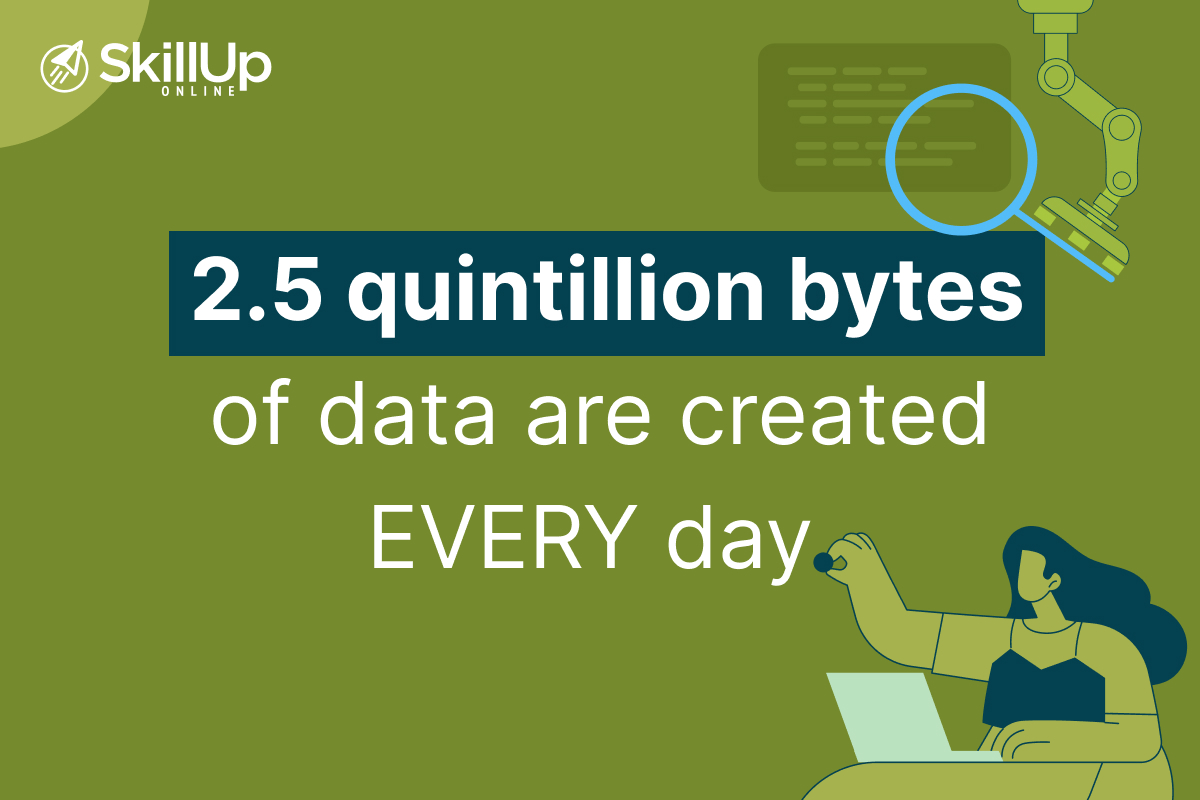If you’re considering a career in data science, you have a lot to look forward to.
According to the U.S. Bureau of Labor Statistics (BLS), data science-related careers are projected to grow by 35% over the next decade, significantly faster than many other professions in the United States. This means that data science is an ideal field to enter if you’re looking for career growth.
So, if you’ve been planning to kickstart a career in data science then now is the right moment. And in this article, we will take you through a step-by-step guide on how you can break into this high-growth domain.
What Skills Are Needed for an Entry Level Position?
To land an entry-level data science job, you need a specific set of technical and human skills. These include:
- Programming Proficiency: Data science heavily relies on programming languages like Python and R. So, proficiency in these languages is essential.
- Data Manipulation and Analysis: Even at entry-level, you need to be adept at cleaning, transforming, and analyzing data.
- Statistical Knowledge: You should have a solid grasp of statistics, including concepts like hypothesis testing, regression analysis, and probability.
- Data Visualization: Data visualization tools such as Matplotlib, Seaborn, or ggplot2 are essential for presenting your findings effectively.
- Problem-Solving Abilities: You should have the ability to approach complex problems systematically, formulate hypotheses, and design experiments or models to test those hypotheses.
- Effective Communication: Strong communication skills are crucial for explaining complex concepts in a clear and understandable manner.
It’s also worth noting that employers evaluate candidates on the basis of technical AND human skills, so it’s important for you to develop both. Thus, be prepared for them to assess your problem-solving skills and your ability to communicate complex concepts clearly.
How To Define Your Data Science Career Path
Defining your career path within the data science domain not only provides focus but also enhances your chances of success at an entry-level. And having a clear idea of the kind of job role you are seeking within a specific industry will help you sharpen your learning path.
There are three aspects that you need to keep in mind here:
- Job Role: Decide on the specific data science role you’re aspiring to, whether it’s a data analyst, machine learning engineer, or data scientist. Your choice of job role will define the learning path you will take.
- Industry Focus: Consider which industry interests you the most. Data science applications vary widely across sectors, including healthcare, finance, marketing, and more.
- Skill Development: Identify the skills you need to acquire and improve. This could involve mastering programming languages, data analysis techniques, or machine learning algorithms.
Here are some practical steps to help you define and achieve your data science career objectives:
- Self-Assessment: Assess your current skills, interests, and strengths. Understand what aspects of data science excite you the most. O*NET offers a variety of self-assessment tools to explore career interests, skills, and work values. Likewise, My Next Move offers a simple and user-friendly interest profiler that can help you discover career options based on your interests.
- Research: Explore the various data science roles and industries to gain a comprehensive understanding of the opportunities available.
- Networking: Connect with professionals in the field. It’s important to seek advice from mentors or those who have successfully navigated their data science careers. A good place to begin this is LinkedIn groups or Stack Overflow.
- Education and Training: Identify the educational resources and training programs that align with your goals. Online courses, certifications, and degree programs can be valuable assets.
- Goal Setting: Establish specific, measurable, achievable, relevant, and time-bound (SMART) goals. Break them down into smaller milestones for manageable progress. For example, a goal that says – “I want to learn data science.”, may not work as well as a SMART goal that says – “I want to complete an online data science course that covers Python programming, data analysis, and machine learning within the next six months”.
By taking these steps, you can create a roadmap that leads to your desired data science career.
Craft Your Data Science Portfolio
Your data science portfolio is your professional showcase—a collection of projects, accomplishments, and skills that demonstrate your value as a data science candidate. Crafting an impressive portfolio is essential for standing out in the competitive job market. So, tailor your portfolio based on your chosen data science role and industry.
- Research: Investigate the specific requirements and expectations of the role you aspire to. Different roles may prioritize different skills and project types.
- Select Relevant Projects: Choose projects that showcase your skills and align these with the job’s demands. For instance, if you’re aiming for a data analyst role in healthcare, include projects related to healthcare data analysis.
- Diversity: Include a variety of projects that demonstrate versatility. Showcase projects related to data cleaning, visualization, predictive modeling, and more.
Practical Advice for Portfolio Building
- Project Descriptions: For each project, provide detailed descriptions that explain the problem you addressed, the techniques you used, and the impact of your work.
- Code Samples: Include code snippets or links to GitHub repositories to demonstrate your coding proficiency.
- Visuals: Use visuals like charts, graphs, and dashboards to make your projects more engaging and understandable.
- Narrative: Craft a narrative around your portfolio. Explain your journey, challenges faced, and lessons learned during each project.
- Documentation: Well-documented projects are highly valued. Include documentation that helps others understand and replicate your work.
- Continuous Updates: Keep your portfolio current by adding new projects and updating existing ones as you acquire more skills and experience.
By following these guidelines and customizing your portfolio to match your career goals, you’ll present yourself as a well-rounded data science professional with practical expertise.
Balance Theory and Practical Skills
A strong foundation in data science theory is essential. This includes understanding statistical concepts, machine learning algorithms, and data analysis methodologies. Such theoretical knowledge provides you with the necessary framework to make informed decisions and choose the right tools and techniques for a given problem.
However, while theory is crucial, it’s through practical application that you truly grasp data science. Employers value practical experience as it demonstrates to them that you have not only theoretical skills but actual practical experience that you would bring to the job from day one.
Strategies for Balancing Theory and Practice
- Learn by Doing: Engage in practical projects, such as analyzing real datasets, building predictive models, or participating in Kaggle competitions.
- Online Courses: Enroll in online skills courses that offer a blend of theory and practical exercises, allowing you to apply what you’ve learned.
- Collaborate: Work with peers on data science projects, as collaboration often simulates real workplace scenarios.
- Stay Curious: Continuously seek to deepen your understanding of data science theory while experimenting with new tools and technologies.
- Feedback Loop: Solicit feedback on your projects to identify areas for improvement and refine your skills.
By balancing theory and practice in data science, you not only become a well-rounded data scientist but also increase your readiness for the challenges and opportunities the field offers
Maximize Data Science Certifications
Certifications are valuable assets in the data science field, providing validation of your skills and expertise. They highlight your proficiency and skill set in a particular area of expertise. Employers use certifications to evaluate the suitability of a candidate for interview, as well as for a specific job role.
Here are some well-recognized data science certification programs and their respective resources:
- Certified Data Scientist (CDS): Offered by some institutions, this certification covers a broad range of data science topics.
- Google Data Analytics Professional Certificate: Google offers a comprehensive Data Analytics Course that includes hands-on labs and projects.
- Microsoft Certified: DP-100: Designing and Implementing a Data Science Solution on Azure is an ideal option for those interested in data science on the Azure platform.
- IBM Data Science Professional Certificate: IBM’s Courses includes coursework on data analysis, visualization, and machine learning.
- TechMaster Certificate Program in Artificial Intelligence with Data Science: This 11-month program opens the door to exciting opportunities in data science and AI. This programme is a good start for beginners as it offers comprehensive learning that provides you with 8 IBM certifications, as well as mapping to 4 Microsoft certifications, plus a capstone project.
Additionally, you might want to kick-start your data science journey by grasping the fundamentals with an Introduction to Data Science Course or a Data Science 101 course. Both these types of course will help you set the framework for a better understanding of the subject matter.
Master Data Science Interviews
Data science interviews can be challenging, but with thorough preparation and effective communication, you can significantly increase your chances of success. Here’s how to master the art of acing data science interviews:
- Review Common Questions: Research common data science interview questions, which often cover topics like statistical analysis, machine learning algorithms, and coding challenges.
- Practice Coding: Be ready for coding assessments. Practice coding challenges on platforms like LeetCode and HackerRank to improve your coding skills.
- Case Studies: Familiarize yourself with data science case studies. Understand how to approach real-world problems and present your solutions clearly.
- Behavioral Questions: Prepare answers for behavioral questions that assess your problem-solving abilities, teamwork, and adaptability.
- Mock Interviews: Conduct mock interviews with peers or mentors to simulate real interview scenarios and receive constructive feedback.
Stay Current in the Data Science Field
The world of data science is ever-evolving, and staying current is essential for getting an entry-level position in the field. Here are some approaches you can take to achieve this.
- Online Forums: Participate in data science forums such as Reddit’s r/datascience or LinkedIn groups. Engage in discussions, share insights, and learn from peers.
- Data Science Blogs: Follow reputable data science blogs and publications to stay updated on industry trends and emerging technologies.
- Social Media: Connect with data science professionals on platforms like Twitter and LinkedIn. Follow thought leaders and organizations for valuable content and updates.
- Professional Associations: Join data science associations like the Data Science Association or the American Statistical Association. Attend their events and conferences.
- Local Meetups: Seek out data science meetups and events in your area. These gatherings provide opportunities for networking and knowledge sharing.
- Online Courses: Enroll in advanced data science courses or workshops to deepen your expertise in specific areas.
- Conferences: Attend data science conferences such as the Data Science Summit, Strata Data Conference, or the International Conference on Machine Learning (ICML).
- Hackathons and Competitions: Engage in data science hackathons and competitions to apply your skills and learn from real-world challenges.
Your Next Steps
Embarking on a data science career is an exciting journey filled with opportunities for growth and innovation. As you venture into this dynamic field, remember that continuous learning and adaptability are your greatest allies. Stay curious, embrace challenges, and never stop exploring the vast world of data science.
If you would like to know more about how you can build the necessary data science skills and get started, contact our Learner Support Team at [email protected]. They will be more than happy to guide you on your next steps.
SkillUp Online







